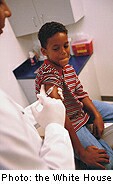
MONDAY, Aug. 30 (HealthDay News) — All children and adolescents 6 months of age and older should receive the annual trivalent influenza vaccine this flu season, according to updated recommendations from the American Academy of Pediatrics.
The AAP also says special efforts should be made to immunize anyone who falls into the following categories: all family members, household contacts and out-of-home care providers of children younger than 5 years of age; children with high-risk conditions such as asthma, diabetes and neurological disorders; health care workers; and pregnant women.
These groups are most vulnerable to flu-related complications, the academy pointed out in a news release.
Two influenza vaccines were recommended last year but only one trivalent vaccine is being made for the 2010-11 seasonal influenza vaccine schedule. In this year’s trivalent vaccine, the 2009 pandemic influenza A (H1N1) strain has replaced last year’s influenza A (H1N1) strain. The new vaccine also includes two other strains of flu virus.
The seasonal flu vaccine policy statement was released online Monday and will be published in the October print issue of the journal Pediatrics.
Other recommendations included in the policy statement are as follows:
- Children younger than 6 months of age should not receive influenza vaccine because they are too young.
- For children 9 years of age and older, only one dose is needed.
- For children younger than 9 years but older than 6 months, a minimum of two doses of 2009 pandemic H1N1 vaccine is needed. If they already received the H1N1 vaccine during last year’s flu season, one dose of vaccine is needed this year, otherwise they will need two doses of seasonal influenza vaccine this year.
- Those under 9 years of age who have never received the seasonal flu vaccine before will need two doses this year.
- Children younger than 9 years who received seasonal flu vaccine last year for the first time, but only received one dose, should receive two doses this year.
- Also, those under 9 years who received a flu vaccine last year, but for whom it is unclear whether it was a seasonal flu vaccine or the H1N1 flu vaccine, should receive two doses this year.
- All children who are recommended to get two doses this year should receive the second dose at least four weeks after the first dose.
More information
The U.S. Centers for Disease Control and Prevention has more about seasonal flu and vaccination.

